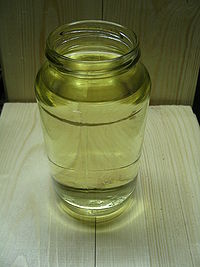
Photo from wikipedia
Abstract Alkylated furans such as 2,5-dimethylfuran and 2-methylfuran can be produced from biomass and have very attractive properties for use as spark-ignition fuel blendstocks. Their high octane numbers, relatively high… Click to show full abstract
Abstract Alkylated furans such as 2,5-dimethylfuran and 2-methylfuran can be produced from biomass and have very attractive properties for use as spark-ignition fuel blendstocks. Their high octane numbers, relatively high energy density, low water solubility, and minimal effect on gasoline blend volatility are potentially significant advantages over alcohol-based fuels. However, prior studies have reported poor oxidative stability for furanic compound-gasoline blends, as well as the potential for the formation of dangerous organic peroxides. We show that alkylated furans have very low oxidative stability compared to conventional gasoline. Upon oxidation they form highly polar ring-opening products that can react with the starting furanic compound to form dimers, trimers, and higher polymers with intact furan rings. Dimers of the starting furan compounds were also observed. These gasoline-insoluble gums can be problematic for fuel storage or in vehicle fuel systems. Evaporation to dryness under ambient conditions also produced gum with similar composition. Gums produced via evaporation were found to contain peroxides; however, whether these pose a threat of shock initiated explosion has not been determined. We also propose a density functional theory-based analysis of possible reaction pathways, showing that OH radicals can form by reaction of the alkyl group and that addition of OH radicals to the furan ring is energetically favored and leads to ring opening products. Antioxidant additives can be effective at limiting the oxidation reaction in gasoline, but require much higher concentrations than are commonly used in commercial gasolines.
Journal Title: Fuel
Year Published: 2018
Link to full text (if available)
Share on Social Media: Sign Up to like & get
recommendations!